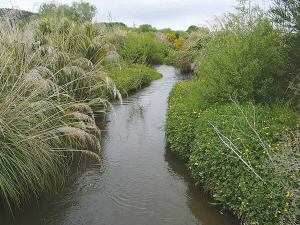Simon Upton urges cross-party consensus on New Zealand environmental goals
Parliamentary Commissioner for the Environment Simon Upton is calling for cross-party consensus on the country's overarching environmental goals.
 More than 600km of Taranaki river and stream banks will be planted with a million native plants next winter.
More than 600km of Taranaki river and stream banks will be planted with a million native plants next winter.
More than 600km of Taranaki river and stream banks will be planted with a million native plants next winter as the region’s farmers take advantage of a $5 million government boost.
The funding for the Transforming Taranaki riparian management programme will allow eligible farmers to buy native plants for $1 each, create 80 new jobs and bring environmental benefits to the entire region.
The Taranaki Regional Council scheme has been running for 27 years, with farmers voluntarily planting and fencing thousands of kilometres of waterways. In that time Council officers have prepared nearly 3,000 individual riparian plans, and more than 6.2 million plants have been distributed at cost.
The programme’s goal is improved water quality and an increase in biodiversity, with the plants providing habitat for native birds and cover for aquatic species.
About 900,000 plants are being contract-grown for the 2021 winter planting season. The opportunity to buy $1 plants will be offered to Council plan holders in the intensively farmed zone of the Taranaki ring plain and coastal marine terraces, with priority given to those who have demonstrated a strong commitment to riparian planting and fencing over the years.
If eligible, they can order between 500 and 2,000 plants per plan.
The cost includes planting by Council-arranged contractors, whereas previously that had been the responsibility of the landowner. Plan holders will be required to erect fences to protect the plants, estimated to be worth $4.1 million. The value of the combined fencing and planting is expected to be near $10.8 million.
Council land services manager Don Shearman says the funding is great news for the region.
“Taranaki farmers have put in years of hard work planting and fencing their waterways all at their own cost – because they know it’s the right thing to do. And many are now so close to completing their plans.
“This funding will save them thousands of dollars, plus precious time, allowing them to push forward to the finishing line.
“We’re already seeing environmental benefits from the programme, with a NIWA study last year finding many Taranaki sites had the best water quality they’d had since 1995. We’re excited to see the improvements continue.”
The $5 million came from the Public Waterways and Ecosystem Restoration Fund, administered by the Ministry for the Environment. It is part of the Government’s wider Jobs for Nature Programme, part of its COVID-19 recovery package.
Greenlea Premier Meats managing director Anthony (Tony) Egan says receiving the officer of the New Zealand Order of Merit (ONZM) honour has been humbling.
Waikato dairy farmer Neil Bateup, made a companion of the New Zealand Order of Merit (CNZM) in the New Year 2026 Honours list, says he’s grateful for the award.
Another Australian state has given the green light to virtual fencing, opening another market for Kiwi company Halter.
Farmer interest continues to grow as a Massey University research project to determine the benefits or otherwise of the self-shedding Wiltshire sheep is underway. The project is five years in and has two more years to go. It was done mainly in the light of low wool prices and the cost of shearing. Peter Burke recently went along to the annual field day held Massey's Riverside farm in the Wairarapa.
Applications are now open for the 2026 NZI Rural Women Business Awards, set to be held at Parliament on 23 July.
Ravensdown has announced a collaboration with Kiwi icon, Footrot Flats in an effort to bring humour, heart, and connection to the forefront of the farming sector.
President Donald Trump’s decision to impose tariffs on imports into the US is doing good things for global trade, according…
Seen a giant cheese roll rolling along Southland’s roads?